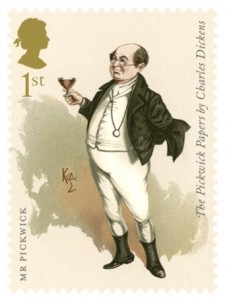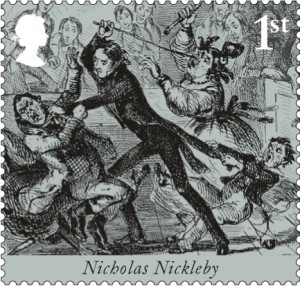
IN CELEBRATION of the life and works of Charles Dickens, the Royal Mail today revealed a sneak preview of two stamps – officially launching in June – to celebrate the bicentenary of the novelist’s birth.
The two stamps feature illustrations from his first novel, The Pickwick Papers (originally serialised and entitled The Posthumous Papers of Pickwick) and his 1838 novel, Nicholas Nickleby.
The character of Mr Pickwick forms a set of six stamps featuring original illustrations adapted from Character Sketches from Charles Dickens, by Joseph Clayton Clarke (otherwise known as Kyd) and originally published around 1890.
The Nicholas Nickleby stamp will be part of a special Miniature Sheet of four stamps of illustrations by Hablot Knight Brown, (known as Phiz ), who illustrated ten books by the author.
Philip Parker, Royal Mail Stamps spokesperson said: “Charles Dickens was one of the truly great British novelists, a man born into poor circumstances who went on to change the world in which he lived thanks not just to his novels, but his campaigning journalism and philanthropy”.
The 7th February will see events across the world taking place to mark the bicentenary of Dickens’ birth – from exhibitions, to writing workshops, re-enactments to retrospective film festivals – Dickens life will truly be an international celebration. In addition there will be wreath laying ceremonies in Portsmouth, his place of birth, and at Westminster Abbey, Dickens’ final resting place.
The full set of ten new stamps will be issued on 19 June and will feature iconic characters from some of his most famous novels, including Oliver Twist, David Copperfield and A Tale of Two Cities.
Troubled
Charles Dickens was born in Portsmouth on February 7, 1812. In 1836 he married Catherine Hogarth, they had ten children.
At the age of nine his family were imprisoned in Marshalsea Debtor’s Prison in Southwark for his father’s debts, while Dickens went to work in a blacking factory. He later used the prison as one of the settings for Little Dorrit.

His first novel The Pickwick Papers was published in 1836.
In 1837 Catharine’s 17-year-old sister Mary died in Dickens’s arms becoming the inspiration for the death of Little Nell in The Old Curiosity Shop.
On June 9, 1865, Dickens survived the Staplehurst rail crash. The First Class carriage he was travelling in was the only one of seven not to plunge off the bridge. Dickens helped to tend the wounded and used his experience later in the ghost story The Signalman.
His final unfinished novel The Mystery of Edwin Drood was published after his death. The identity of the murderer was never revealed.
Dickens was interred at Poet’s Corner in Westminster Abbey, despite his wish to be buried at Rochester Cathedral
His best-selling novel, A Tale of Two Cities has sold over 200 million copies
Between 1992 and 2003 Dickens was featured on the reverse of the Bank of England £10 note together with a scene from The Pickwick Papers
Dickens’ most autobiographical work was also his favourite – David Copperfield.
Such was the interest generated by the serialisation of his work, a huge crowd gathered at the dock in Boston to await the ship that carried chapter 71 of Dickens’ The Old Curiosity Shop.
The only person said to be able to predict the conclusion of Dickens’ complex plots was the American author and poet Edgar Allan Poe.
Dickens is regarded as the most ‘adapted’ author of all time, all of his novels have been adapted for the cinema or television and in addition to modern versions, around 100 silent films were made – a third of which still exist.

